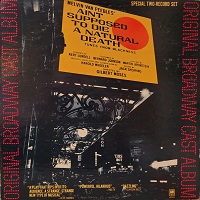 Original Broadway Cast, 1971 (A&R, 2LPs; no CD)
Original Broadway Cast, 1971 (A&R, 2LPs; no CD)  (2 / 5) Onstage, this piece with book, music, and lyrics by Melvin van Peebles was intensely theatrical; I was actually frightened when cast member Minnie Gentry looked straight at me and vowed to “Put a Curse on You.” On record, it’s a less powerful experience — an interesting assemblage of jazz-based songs, dramatic monologues, and narratives delivered by a cast including Bill Duke, Albert Hall, Garrett Morris, and Beatrice Winde. (Ossie Davis and Phylicia Rashad joined the company in 1972, after this recording was made.) Much of the show is written in what might be called a “street poetry” style, if that phrase is not too pretentious. Ain’t Supposed to Die a Natural Death is skillfully constructed, with the songs and the very attractive underscoring enhancing the monologues as they move into, out of, and around them. I can’t say this is a cast album I listen to every day, but if you can find a copy, it certainly won’t bore you. — David Wolf
(2 / 5) Onstage, this piece with book, music, and lyrics by Melvin van Peebles was intensely theatrical; I was actually frightened when cast member Minnie Gentry looked straight at me and vowed to “Put a Curse on You.” On record, it’s a less powerful experience — an interesting assemblage of jazz-based songs, dramatic monologues, and narratives delivered by a cast including Bill Duke, Albert Hall, Garrett Morris, and Beatrice Winde. (Ossie Davis and Phylicia Rashad joined the company in 1972, after this recording was made.) Much of the show is written in what might be called a “street poetry” style, if that phrase is not too pretentious. Ain’t Supposed to Die a Natural Death is skillfully constructed, with the songs and the very attractive underscoring enhancing the monologues as they move into, out of, and around them. I can’t say this is a cast album I listen to every day, but if you can find a copy, it certainly won’t bore you. — David Wolf
All posts by Michael Portantiere
After the Fair
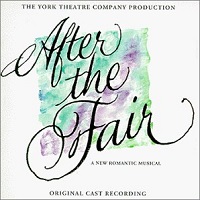 Original Off-Broadway Cast, 1999 (Varèse Sarabande)
Original Off-Broadway Cast, 1999 (Varèse Sarabande)  (2 / 5) It’s the very model of a modern chamber musical: a four-character, four-musician adaptation of a Thomas Hardy short story, here brought to life by Matthew Ward (music) and Stephen Cole (book and lyrics), and lovingly recorded by producer Bruce Kimmel. The slight plot — about a bored, unhappy, provincial couple (Michele Pawk and David Staller) and the wife’s Cyranoesque adventures in helping her maid (Jennifer Piech) conduct a romance with a London barrister (James Ludwig) — comes through clearly and affectingly. Cole’s lyrical craftmanship is striking (“With each passing missive, you grew more passive”) , and Ward’s music, aside from some dreary recitative, isn’t afraid of tunefulness or smart melodic development when the occasion demands. Diligent as the authors are, though, the score’s a bit studied; it sounds something like a Sondheim disciple’s thesis for a graduate degree in musical theater. And the unvarying parade of duets, quartets, and genteel accompaniment adds up to a rather limited musical palette. (Maybe the score worked better in the context of the show onstage.) The cast is variable: Pawk is excellent, Ludwig is sturdy, but you could drive a lorry through the hammy Staller’s vibrato, and Piech’s cartoon-Brit accent simply won’t do. Who was her dialect coach, Dick Van Dyke? — Marc Miller
(2 / 5) It’s the very model of a modern chamber musical: a four-character, four-musician adaptation of a Thomas Hardy short story, here brought to life by Matthew Ward (music) and Stephen Cole (book and lyrics), and lovingly recorded by producer Bruce Kimmel. The slight plot — about a bored, unhappy, provincial couple (Michele Pawk and David Staller) and the wife’s Cyranoesque adventures in helping her maid (Jennifer Piech) conduct a romance with a London barrister (James Ludwig) — comes through clearly and affectingly. Cole’s lyrical craftmanship is striking (“With each passing missive, you grew more passive”) , and Ward’s music, aside from some dreary recitative, isn’t afraid of tunefulness or smart melodic development when the occasion demands. Diligent as the authors are, though, the score’s a bit studied; it sounds something like a Sondheim disciple’s thesis for a graduate degree in musical theater. And the unvarying parade of duets, quartets, and genteel accompaniment adds up to a rather limited musical palette. (Maybe the score worked better in the context of the show onstage.) The cast is variable: Pawk is excellent, Ludwig is sturdy, but you could drive a lorry through the hammy Staller’s vibrato, and Piech’s cartoon-Brit accent simply won’t do. Who was her dialect coach, Dick Van Dyke? — Marc Miller
New York, New York
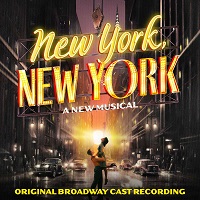 Original Broadway Cast, 2023 (Wine & Peaches LLC)
Original Broadway Cast, 2023 (Wine & Peaches LLC)  (0.5 / 5) New York, New York is destined to go down in musical theater history books for its creative team, which includes the legendary composer John Kander as well as director/choreographer Susan Stroman and lyricist Lin Manuel Miranda, who spearheaded the two most Tony-nominated musicals of all time. Unfortunately, the show itself will be remembered as a colossal disappointment: Rather than a love letter to the city that doesn’t sleep, or even to the post-WW II era in which the action takes place, what we have here is a misguided mishmash of weaker items from the Kander & Ebb repertoire forced into a stage musical with the number of main and featured characters greatly expanded from the film on which it is very loosely based. The plot largely concerns the troubled romance between struggling musician Jimmy Doyle and struggling singer Francine Evans, but the creators seem to have determined that these characters weren’t interesting enough for an entire show. As a result, also on hand to clutter up the proceedings are an Hispanic immigrant and his abusive father and loving mother, a cleaning woman turned opera singer, a Jewish immigrant and his violin teacher, et al. “A Quell ‘Amor,” performed by the newly minted opera singer, is perhaps the nadir of the show; it makes no sense in or out of context, we never hear from its singer again, and the song’s title is 50% of its lyrics. Indeed, lyrics are not the primary concern of this production, as shown by the inclusion of six extended instrumental pieces titled “Morning in New York,” “New York in the Rain,” “New York in the Summer,” “New York in the Snow,” “New York at Night,” and “New York Concerto.” (Orchestrators Sam Davis and Daryl Waters have done an admirable job of creating a period feel and an excitement that’s lacking in the plot.) One of the oddest aspects of the show and this album is the fact that Colton Ryan, who portrays Jimmy Doyle, sings every song as if he were being strangled, emitting some of the ugliest vowel sounds ever heard. On the other hand, Anna Uzele as Francine raises the roof with her big numbers, but her acting is not quite at the level of her vocal ability. The only two pitch-perfect performances are from Emily Skinner, as the aforementioned violin teacher, and the sadly underused Clyde Alves, as the leading man’s best friend. Four demo recording are appended to this album, and in the tracks where you can hear Fred Ebb singing his own material, you start to understand what this show could’ve been if that great lyricist had lived longer: a unique, biting, entertaining final curtain call for Kander & Ebb. Instead, listeners may end up, to quote one of the show’s stronger songs, sorry they asked. — Charles Kirsch
(0.5 / 5) New York, New York is destined to go down in musical theater history books for its creative team, which includes the legendary composer John Kander as well as director/choreographer Susan Stroman and lyricist Lin Manuel Miranda, who spearheaded the two most Tony-nominated musicals of all time. Unfortunately, the show itself will be remembered as a colossal disappointment: Rather than a love letter to the city that doesn’t sleep, or even to the post-WW II era in which the action takes place, what we have here is a misguided mishmash of weaker items from the Kander & Ebb repertoire forced into a stage musical with the number of main and featured characters greatly expanded from the film on which it is very loosely based. The plot largely concerns the troubled romance between struggling musician Jimmy Doyle and struggling singer Francine Evans, but the creators seem to have determined that these characters weren’t interesting enough for an entire show. As a result, also on hand to clutter up the proceedings are an Hispanic immigrant and his abusive father and loving mother, a cleaning woman turned opera singer, a Jewish immigrant and his violin teacher, et al. “A Quell ‘Amor,” performed by the newly minted opera singer, is perhaps the nadir of the show; it makes no sense in or out of context, we never hear from its singer again, and the song’s title is 50% of its lyrics. Indeed, lyrics are not the primary concern of this production, as shown by the inclusion of six extended instrumental pieces titled “Morning in New York,” “New York in the Rain,” “New York in the Summer,” “New York in the Snow,” “New York at Night,” and “New York Concerto.” (Orchestrators Sam Davis and Daryl Waters have done an admirable job of creating a period feel and an excitement that’s lacking in the plot.) One of the oddest aspects of the show and this album is the fact that Colton Ryan, who portrays Jimmy Doyle, sings every song as if he were being strangled, emitting some of the ugliest vowel sounds ever heard. On the other hand, Anna Uzele as Francine raises the roof with her big numbers, but her acting is not quite at the level of her vocal ability. The only two pitch-perfect performances are from Emily Skinner, as the aforementioned violin teacher, and the sadly underused Clyde Alves, as the leading man’s best friend. Four demo recording are appended to this album, and in the tracks where you can hear Fred Ebb singing his own material, you start to understand what this show could’ve been if that great lyricist had lived longer: a unique, biting, entertaining final curtain call for Kander & Ebb. Instead, listeners may end up, to quote one of the show’s stronger songs, sorry they asked. — Charles Kirsch
KPOP
 Original Broadway Cast, 2023 (Masterworks Broadway)
Original Broadway Cast, 2023 (Masterworks Broadway)  (0.5 / 5) In 2021, the South Korean music industry earned around $773 million in revenue, a figure that has been increasing since K-pop as a genre began. Listening to the cast album of the Broadway musical that attempted to celebrate that art form, one question may present itself: Why? Helen Park and Max Vernon’s score does not do much to provide an answer. It’s painfully generic, veering between the cheapest, loudest form of electronic dance music, energetic pop in the style of Britney Spears, and the sappiest ballads heard on Broadway in recent memory, without ever landing on its own style. As for the lyrics, there are rhymes and off-rhymes such as “America/hysterical/generic-uh.” Like so many musicals before it, KPOP was built around a star — in this case, a Korean musical theater actress and K-pop singer named Luna. She is unquestionably talented in terms of vocal range and power, but neither she nor the rest of the cast members are well served by the material, and because of the ensemble’s non-specific diction, it’s often hard to tell which of the two languages that the show incorporates is being sung. Almost every song in this score is diegetic, performed as part of the concerts-within-the-show. As a result, the musical’s tenuous emotional arc, concerning a pseudo-Mama Rose who has pushed MwE (the character portrayed by Luna) to succeed, is totally lost in an audio recording that eliminates the book scenes. Of course, neither can the Broadway production’s highly energetic choreography or its bright, fun costumes be experienced via the cast album, which removes about 85% of what this show had to offer. Ironically, the album makes it eminently clear that this music was not meant to be listened to on its own, and you may find it difficult to distinguish any particular song from the rest. The one worthy exception is “Still I Love You,” a musical theater-esque song delivered by Luna with great beauty. While the last song of the show is titled “Blast Off,” it may appear to listeners that KPOP never rises above the level of elevator music. — Charles Kirsch
(0.5 / 5) In 2021, the South Korean music industry earned around $773 million in revenue, a figure that has been increasing since K-pop as a genre began. Listening to the cast album of the Broadway musical that attempted to celebrate that art form, one question may present itself: Why? Helen Park and Max Vernon’s score does not do much to provide an answer. It’s painfully generic, veering between the cheapest, loudest form of electronic dance music, energetic pop in the style of Britney Spears, and the sappiest ballads heard on Broadway in recent memory, without ever landing on its own style. As for the lyrics, there are rhymes and off-rhymes such as “America/hysterical/generic-uh.” Like so many musicals before it, KPOP was built around a star — in this case, a Korean musical theater actress and K-pop singer named Luna. She is unquestionably talented in terms of vocal range and power, but neither she nor the rest of the cast members are well served by the material, and because of the ensemble’s non-specific diction, it’s often hard to tell which of the two languages that the show incorporates is being sung. Almost every song in this score is diegetic, performed as part of the concerts-within-the-show. As a result, the musical’s tenuous emotional arc, concerning a pseudo-Mama Rose who has pushed MwE (the character portrayed by Luna) to succeed, is totally lost in an audio recording that eliminates the book scenes. Of course, neither can the Broadway production’s highly energetic choreography or its bright, fun costumes be experienced via the cast album, which removes about 85% of what this show had to offer. Ironically, the album makes it eminently clear that this music was not meant to be listened to on its own, and you may find it difficult to distinguish any particular song from the rest. The one worthy exception is “Still I Love You,” a musical theater-esque song delivered by Luna with great beauty. While the last song of the show is titled “Blast Off,” it may appear to listeners that KPOP never rises above the level of elevator music. — Charles Kirsch
Some Like It Hot
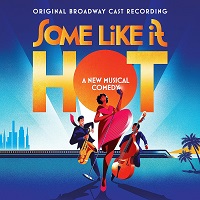 Original Broadway Cast, 2023 (Concord Theatricals)
Original Broadway Cast, 2023 (Concord Theatricals)  (2 / 5) Broadway musicals based on movies are nothing new, but Billy Wilder’s masterpiece Some Like it Hot may hold the distinction of being the only movie to serve as the basis for two Broadway musicals. First, there was Jule Styne, Bob Merrill, and Peter Stone’s attempt in 1972, resulting in the inoffensive but unimpressive Sugar. And now, 50 years later, Marc Shaiman and Scott Wittman, working in collaboration with book writers Matthew Lopez and Amber Ruffin, have taken their shot. Shaiman and Wittman brought an electrifying originality to their stellar pastiche score for Hairspray, so the duo might have seemed a perfect fit to write a ’20s-era jazz score with a modern twist. The Lopez/Ruffin book aims to expand upon the movie’s themes of gender and sexuality with more currency, and an excitingly diverse cast has been assembled this time around, so the new version appeared to have all the ingredients necessary to supplant 1972’s missed opportunity. And yet, it still doesn’t make a strong enough case for musicalizing the source material. Shaiman and Wittman’s lyrics are as succinct and cheeky as ever (“You Can’t Have Me If You Don’t Have Him,” “Poor Little Millionaire”), but Shaiman’s music lacks identity; if everything sounds enjoyable in a pastiche way, nothing sounds distinctive. While the cast album gets off to a fun, hyper start with “What are You Thirsty For?”, each song that follows insists on maintaining that same level of energy, so the score soon begins to sound frenetic as the songs blend together and/or remind you of jingles from the past. (The title song bears a very strong resemblance to the theme song from the old animated TV show Huckleberry Hound.) And though Charlie Rosen and Bryan Carter’s orchestrations are properly splashy and broad, they lack the steam that makes jazz of the ’20s special. Some of the cast members do strong work, J. Harrison Ghee scoring with Jerry/Daphne’s Act 2 showstopper “You Coulda Knocked Me Over With a Feather” and Kevin Del Aguila perfect as the impish millionaire Osgood in “Let’s Be Bad.” Less successful are Christian Borle as Joe/Josephine and Adrianna Hicks as Sugar Kane; while Borle is always an entertaining presence, he’s rather miscast as the caddish Joe, and Hicks comes across as too polished for the messy Sugar. It’s also unfortunate that Shaiman and Wittman felt the need to make Hicks reach for the rafters of her upper register in the final verse of every one of Sugar’s songs, such as “A Darker Shade of Blue” and “Ride Out the Storm.” Even though Hicks handles it all with ease and aplomb, it would’ve been nice to hear more of Sugar’s vulnerability in softer, more lyrical singing. But that, in a nut shell, is what keeps this score from taking off: It’s so eager to get hot that it never stops to consider when it can relax and simmer instead of boil and bubble. — Matt Koplik
(2 / 5) Broadway musicals based on movies are nothing new, but Billy Wilder’s masterpiece Some Like it Hot may hold the distinction of being the only movie to serve as the basis for two Broadway musicals. First, there was Jule Styne, Bob Merrill, and Peter Stone’s attempt in 1972, resulting in the inoffensive but unimpressive Sugar. And now, 50 years later, Marc Shaiman and Scott Wittman, working in collaboration with book writers Matthew Lopez and Amber Ruffin, have taken their shot. Shaiman and Wittman brought an electrifying originality to their stellar pastiche score for Hairspray, so the duo might have seemed a perfect fit to write a ’20s-era jazz score with a modern twist. The Lopez/Ruffin book aims to expand upon the movie’s themes of gender and sexuality with more currency, and an excitingly diverse cast has been assembled this time around, so the new version appeared to have all the ingredients necessary to supplant 1972’s missed opportunity. And yet, it still doesn’t make a strong enough case for musicalizing the source material. Shaiman and Wittman’s lyrics are as succinct and cheeky as ever (“You Can’t Have Me If You Don’t Have Him,” “Poor Little Millionaire”), but Shaiman’s music lacks identity; if everything sounds enjoyable in a pastiche way, nothing sounds distinctive. While the cast album gets off to a fun, hyper start with “What are You Thirsty For?”, each song that follows insists on maintaining that same level of energy, so the score soon begins to sound frenetic as the songs blend together and/or remind you of jingles from the past. (The title song bears a very strong resemblance to the theme song from the old animated TV show Huckleberry Hound.) And though Charlie Rosen and Bryan Carter’s orchestrations are properly splashy and broad, they lack the steam that makes jazz of the ’20s special. Some of the cast members do strong work, J. Harrison Ghee scoring with Jerry/Daphne’s Act 2 showstopper “You Coulda Knocked Me Over With a Feather” and Kevin Del Aguila perfect as the impish millionaire Osgood in “Let’s Be Bad.” Less successful are Christian Borle as Joe/Josephine and Adrianna Hicks as Sugar Kane; while Borle is always an entertaining presence, he’s rather miscast as the caddish Joe, and Hicks comes across as too polished for the messy Sugar. It’s also unfortunate that Shaiman and Wittman felt the need to make Hicks reach for the rafters of her upper register in the final verse of every one of Sugar’s songs, such as “A Darker Shade of Blue” and “Ride Out the Storm.” Even though Hicks handles it all with ease and aplomb, it would’ve been nice to hear more of Sugar’s vulnerability in softer, more lyrical singing. But that, in a nut shell, is what keeps this score from taking off: It’s so eager to get hot that it never stops to consider when it can relax and simmer instead of boil and bubble. — Matt Koplik
As You Like It
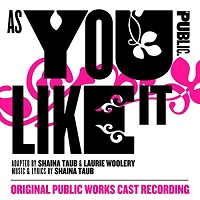 Original Public Works Cast, 2022 (Concord Theatrical Recordings)
Original Public Works Cast, 2022 (Concord Theatrical Recordings)  (3 / 5) The second of composer-lyricist Shaina Taub’s Shakespeare adaptations for the Public Theater’s Public Works program, following Twelfth Night, this As You Like It is a joyful update of Shakespeare’s comedy. In songs like “You Phoebe Me” and “Gettin’ Married Tomorrow,” Taub playfully riffs on Shakespeare’s text in her lyrics. These songs sound closer to those that may be heard on Taub’s solo singer-songwriter albums than to her work on Twelfth Night, so Rosalind sings with a confessional, conversational cynicism in Rebecca Naomi Jones’s thoughtful, strongly-sung performance. Ato Blankson-Wood, who played Orsino in Twelfth Night, sounds wonderful again here. Taub herself is the best interpreter of Taub, and her opening delivery of “All The World’s A Stage” as the moody Jacques (reimagined here as a climate activist) is the album’s highlight. If you’re somehow immune to her charming navigation of her bluesy pop melodies, the chorus of children joining in her song will win you over. These young singers are part of Public Works’ engagement in each of these productions of nearly 100 performers, most of them amateurs, through partnering community organizations. The numerous ensemble moments heard here — including the rousing “In Arden,” led by Darius de Haas, and the gospel-inspired anthem “Still I Will Love” — capture the sense of massive community singing better than the Twelfth Night cast album does. But there’s a little bit of you-had-to-be-there energy to the recording; it’s the memory of the Public’s multi-generational staging that lends these tracks their greatest emotional potency. — Dan Rubins
(3 / 5) The second of composer-lyricist Shaina Taub’s Shakespeare adaptations for the Public Theater’s Public Works program, following Twelfth Night, this As You Like It is a joyful update of Shakespeare’s comedy. In songs like “You Phoebe Me” and “Gettin’ Married Tomorrow,” Taub playfully riffs on Shakespeare’s text in her lyrics. These songs sound closer to those that may be heard on Taub’s solo singer-songwriter albums than to her work on Twelfth Night, so Rosalind sings with a confessional, conversational cynicism in Rebecca Naomi Jones’s thoughtful, strongly-sung performance. Ato Blankson-Wood, who played Orsino in Twelfth Night, sounds wonderful again here. Taub herself is the best interpreter of Taub, and her opening delivery of “All The World’s A Stage” as the moody Jacques (reimagined here as a climate activist) is the album’s highlight. If you’re somehow immune to her charming navigation of her bluesy pop melodies, the chorus of children joining in her song will win you over. These young singers are part of Public Works’ engagement in each of these productions of nearly 100 performers, most of them amateurs, through partnering community organizations. The numerous ensemble moments heard here — including the rousing “In Arden,” led by Darius de Haas, and the gospel-inspired anthem “Still I Will Love” — capture the sense of massive community singing better than the Twelfth Night cast album does. But there’s a little bit of you-had-to-be-there energy to the recording; it’s the memory of the Public’s multi-generational staging that lends these tracks their greatest emotional potency. — Dan Rubins
Twelfth Night
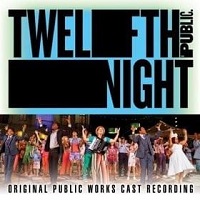 Original Public Works Cast, 2018 (Craft Recordings)
Original Public Works Cast, 2018 (Craft Recordings)  (4 / 5) The first (and better) of Shaina Taub’s pair of Shakespeare-inspired scores for the Public Theater’s Public Works program, Twelfth Night marvelously marries Taub’s distinctive blues-inflected funk pop vocabulary with Mike Brun’s New Orleans brass arrangements. Taub turns Shakespeare into an ideal collaborator; spoken excerpts of the play’s text weave seamlessly in and out of the songs, and Taub finds the germ of each song in Shakespeare’s language. A well-constructed opening number, “Play On,” musically stresses the story’s love triangle. Nikki M. James (Viola), Nanya-Akuki Goodrich (Olivia), and Ato Blankson-Wood (Orsino) all sing terrifically, and Taub frequently throws her characters into sinewy, climactic counterpoints that capture the play’s tangled romantic webs. The comic material for Sir Toby Belch (Shuler Hensley) and Malvolio (Andrew Kober) is slighter stuff, but Taub adds in a few fun ensemble numbers (example: “Word on the Street”) for Illyria’s gossipy citizenry. Best of all is “Is This Not Love,” a ballad sung yearningly first by Taub herself as the clown, Feste, and then reprised powerfully by ensemble member Vivian Jett. — Dan Rubins
(4 / 5) The first (and better) of Shaina Taub’s pair of Shakespeare-inspired scores for the Public Theater’s Public Works program, Twelfth Night marvelously marries Taub’s distinctive blues-inflected funk pop vocabulary with Mike Brun’s New Orleans brass arrangements. Taub turns Shakespeare into an ideal collaborator; spoken excerpts of the play’s text weave seamlessly in and out of the songs, and Taub finds the germ of each song in Shakespeare’s language. A well-constructed opening number, “Play On,” musically stresses the story’s love triangle. Nikki M. James (Viola), Nanya-Akuki Goodrich (Olivia), and Ato Blankson-Wood (Orsino) all sing terrifically, and Taub frequently throws her characters into sinewy, climactic counterpoints that capture the play’s tangled romantic webs. The comic material for Sir Toby Belch (Shuler Hensley) and Malvolio (Andrew Kober) is slighter stuff, but Taub adds in a few fun ensemble numbers (example: “Word on the Street”) for Illyria’s gossipy citizenry. Best of all is “Is This Not Love,” a ballad sung yearningly first by Taub herself as the clown, Feste, and then reprised powerfully by ensemble member Vivian Jett. — Dan Rubins
Wonderland
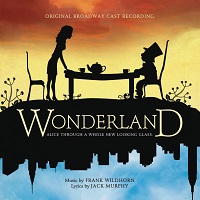 Original Broadway Cast, 2011 (Masterworks Broadway)
Original Broadway Cast, 2011 (Masterworks Broadway)  (3 / 5) If you’re looking for an under-the-radar guilty pleasure album, you could do worse than Wonderland. It’s the silliest and least self-important of Frank Wildhorn’s scores, and the first act especially is a wacky delight. “We’re all a little nuts, in case you didn’t know,” the denizens of Wonderland tell an all-grown-up Alice (Janet Dacal) in this unconvincing twist on Lewis Carroll (please don’t listen for the plot), and the music is a little nuts, too. The Wonderland setting and the panoply of fantasy characters allow Wildhorn to pastiche any style he can think of: there’s a soulful caterpillar (E. Clayton Cornelious), a pop salsa-dancing Cheshire Cat called El Gato (Jose Llana), and a boy band-fronting White Knight (Darren Ritchie). Their trio of songs, which come back-to-back-to-back early on the album, are well-made, playful, and fun. Dacal, whose Alice communicates exclusively through a pop belt dialed up to 11, is always an appealing vocal presence, especially in the aggressively catchy “Through the Looking Glass.” They’re all overshadowed, though, by the extraordinary Kate Shindle (before her election to the presidency of Actors’ Equity) as an electrifyingly villainous Mad Hatter who screlts to bring the chandelier down. The versatile orchestrations, by Wildhorn’s frequent collaborator Kim Scharnberg, are a hoot. Alas, the second act is an unoriginal slog until the finale, “Finding Wonderland,” which recalls The Wiz’s “Home” (as opposed to this show’s sweet opening number, also called “Home”) and showcases Dacal’s substantial gifts. — Dan Rubins
(3 / 5) If you’re looking for an under-the-radar guilty pleasure album, you could do worse than Wonderland. It’s the silliest and least self-important of Frank Wildhorn’s scores, and the first act especially is a wacky delight. “We’re all a little nuts, in case you didn’t know,” the denizens of Wonderland tell an all-grown-up Alice (Janet Dacal) in this unconvincing twist on Lewis Carroll (please don’t listen for the plot), and the music is a little nuts, too. The Wonderland setting and the panoply of fantasy characters allow Wildhorn to pastiche any style he can think of: there’s a soulful caterpillar (E. Clayton Cornelious), a pop salsa-dancing Cheshire Cat called El Gato (Jose Llana), and a boy band-fronting White Knight (Darren Ritchie). Their trio of songs, which come back-to-back-to-back early on the album, are well-made, playful, and fun. Dacal, whose Alice communicates exclusively through a pop belt dialed up to 11, is always an appealing vocal presence, especially in the aggressively catchy “Through the Looking Glass.” They’re all overshadowed, though, by the extraordinary Kate Shindle (before her election to the presidency of Actors’ Equity) as an electrifyingly villainous Mad Hatter who screlts to bring the chandelier down. The versatile orchestrations, by Wildhorn’s frequent collaborator Kim Scharnberg, are a hoot. Alas, the second act is an unoriginal slog until the finale, “Finding Wonderland,” which recalls The Wiz’s “Home” (as opposed to this show’s sweet opening number, also called “Home”) and showcases Dacal’s substantial gifts. — Dan Rubins
Chaplin
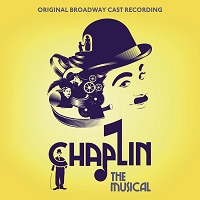 Original Broadway Cast, 2012 (Masterworks Broadway)
Original Broadway Cast, 2012 (Masterworks Broadway)  (2 / 5) In “Just Another Day in Hollywood,” the ensemble of Chaplin sings of “Stars on the rise / Stars on the fall / Stars you forget / Stars you recall.” For all its potential in dramatizing The Little Tramp’s rise and fall in stage musical form, Chaplin turns out to be largely forgettable. Composer-lyricist Christopher Curtis has some neat ideas: for example, an early diegetic number, “Whatcha Gonna Do?”, sung by Charlie Chaplin’s music hall performer mother (Christianne Noll), gradually evolves into a threatening anthem for the McCarthyist columnist Hedda Hopper (Jenn Colella) who tries to bring down Chaplin (Rob McClure) by branding him as a Communist. But Curtis’s songs do little either to develop character or counteract the show’s breakneck race through Chaplin’s life, and most of the first act is a movie-making montage with pastiche songs that don’t evoke the era of the action precisely enough. Often, the score tries to rev up emotional intensity that the storytelling hasn’t earned; one musical sequence, “The Exile,” is almost hilariously melodramatic, as Larry Hochman’s orchestrations follow Curtis’s music in somehow being simultaneously undercooked and overwrought. Elsewhere, thankfully, as in Charlie’s ballad “The Life That You Wished For,” the orchestrations calm down enough to be genuinely stirring. Colella’s belting is impressive, as are Erin Mackey’s very lovely, shimmery singing and Michael McCormick’s avuncular take on Mack Sennett — yes, the same guy from Mack and Mabel! Though McClure in the title role doesn’t have great material to work with, he’s particularly enlivening in the driving “Tramp Shuffle — Pt. 2,” and quite moving in portraying an elderly Chaplin returning to the Oscars at the start of the finale. — Dan Rubins
(2 / 5) In “Just Another Day in Hollywood,” the ensemble of Chaplin sings of “Stars on the rise / Stars on the fall / Stars you forget / Stars you recall.” For all its potential in dramatizing The Little Tramp’s rise and fall in stage musical form, Chaplin turns out to be largely forgettable. Composer-lyricist Christopher Curtis has some neat ideas: for example, an early diegetic number, “Whatcha Gonna Do?”, sung by Charlie Chaplin’s music hall performer mother (Christianne Noll), gradually evolves into a threatening anthem for the McCarthyist columnist Hedda Hopper (Jenn Colella) who tries to bring down Chaplin (Rob McClure) by branding him as a Communist. But Curtis’s songs do little either to develop character or counteract the show’s breakneck race through Chaplin’s life, and most of the first act is a movie-making montage with pastiche songs that don’t evoke the era of the action precisely enough. Often, the score tries to rev up emotional intensity that the storytelling hasn’t earned; one musical sequence, “The Exile,” is almost hilariously melodramatic, as Larry Hochman’s orchestrations follow Curtis’s music in somehow being simultaneously undercooked and overwrought. Elsewhere, thankfully, as in Charlie’s ballad “The Life That You Wished For,” the orchestrations calm down enough to be genuinely stirring. Colella’s belting is impressive, as are Erin Mackey’s very lovely, shimmery singing and Michael McCormick’s avuncular take on Mack Sennett — yes, the same guy from Mack and Mabel! Though McClure in the title role doesn’t have great material to work with, he’s particularly enlivening in the driving “Tramp Shuffle — Pt. 2,” and quite moving in portraying an elderly Chaplin returning to the Oscars at the start of the finale. — Dan Rubins
Half a Sixpence
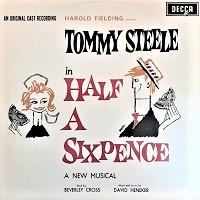 Original London Cast, 1963 (Decca/Must Close Saturday)
Original London Cast, 1963 (Decca/Must Close Saturday)  (3 / 5) There’s no question that Half A Sixpence, the musical adaptation of the H. G. Wells novel Kipps, was all about spotlighting Tommy Steele, the British singer, guitarist, and banjo boy who won teenage hearts in the late 1950s before turning to theater. Steele brings gregarious energy to the role of Arthur Kipps, a hard-working orphan who inherits a surprise fortune that leads him astray. (You can almost hear his grin through your speakers.) But although he may be the scene-Steeler here, the real star is David Heneker’s utterly lovely, music hall-inspired score, buoyed by the sweeping orchestrations of Arthur Wilkinson and Peter Knight and well conducted by Kenneth Alwyn. Marti Webb plays Arthur’s down-to-earth childhood sweetheart Ann with Cockney brassiness; the role would diminish a bit in subsequent productions, but Webb makes a meal of the substantial material she’s given here. Anna Barry as Ann’s rival, Helen, has a quirky operatic song, “The Oak and the Ash,” which would be gone by the time the show reached Broadway. And though this original London cast album doesn’t give us the most electric of Steele’s recorded performances in the role, it preserves a number of songs that aren’t available anywhere else in their original form, such as the Blue Danubey waltz “The Old Military Canal,” the gently bouncing duet “The One That’s Run Away” (which would be repurposed for the 2016 revisal), and a lengthy, two-part counterpoint number, “I’ll Build A Palace”/”I Only Want A Little House,” that seems like a British precursor to “An Old-Fashioned Wedding,” written by Irving Berlin for the 1966 Lincoln Center revival of Annie Get Your Gun. — Dan Rubins
(3 / 5) There’s no question that Half A Sixpence, the musical adaptation of the H. G. Wells novel Kipps, was all about spotlighting Tommy Steele, the British singer, guitarist, and banjo boy who won teenage hearts in the late 1950s before turning to theater. Steele brings gregarious energy to the role of Arthur Kipps, a hard-working orphan who inherits a surprise fortune that leads him astray. (You can almost hear his grin through your speakers.) But although he may be the scene-Steeler here, the real star is David Heneker’s utterly lovely, music hall-inspired score, buoyed by the sweeping orchestrations of Arthur Wilkinson and Peter Knight and well conducted by Kenneth Alwyn. Marti Webb plays Arthur’s down-to-earth childhood sweetheart Ann with Cockney brassiness; the role would diminish a bit in subsequent productions, but Webb makes a meal of the substantial material she’s given here. Anna Barry as Ann’s rival, Helen, has a quirky operatic song, “The Oak and the Ash,” which would be gone by the time the show reached Broadway. And though this original London cast album doesn’t give us the most electric of Steele’s recorded performances in the role, it preserves a number of songs that aren’t available anywhere else in their original form, such as the Blue Danubey waltz “The Old Military Canal,” the gently bouncing duet “The One That’s Run Away” (which would be repurposed for the 2016 revisal), and a lengthy, two-part counterpoint number, “I’ll Build A Palace”/”I Only Want A Little House,” that seems like a British precursor to “An Old-Fashioned Wedding,” written by Irving Berlin for the 1966 Lincoln Center revival of Annie Get Your Gun. — Dan Rubins
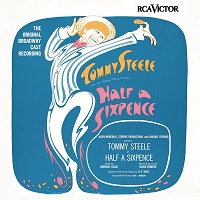 Original Broadway Cast, 1965 (RCA)
Original Broadway Cast, 1965 (RCA)  (4 / 5) Judging from the cast album, the original London production of Half a Sixpence already seemed like The Tommy Steele Show, and the cuts and additions made for Broadway took that to the next level: Steele sings in all but one song on this recording. Once again, charm ripples across David Heneker’s melodies — now with even more gorgeous orchestrations from Jim Tyler, best known for La Cage aux Folles — especially in the lilting title song and a sweet ballad, “Long Ago,” for Arthur and Ann (Polly James). While the show is overstuffed with ensemble numbers (“The Party’s On The House,” added for the Broadway production and including a weirdly American-sounding swing section, is least essential), most of them are pleasant listens, with dance arrangements and orchestrations by Robert Prince. “If the Rain’s Gonna Fall” is an especially jubilant, strolling tune that showcases Heneker’s lyric-writing aptitude, so jovial that the occasional oddball rhyme can be forgiven. “What could be wetter or damper / Than to sit on a picnic hamper / Sipping a sasparilla / Underneath the leaky umbrella?” croon Steele and the cast, and it’s totally delightful. Equally rewarding are the instrumental gems scattered throughout the album — for example, Steele’s dextrous banjo solo in “Money to Burn,” a touching flute and violin duet in the middle of “Long Ago,” and the short but sumptuous overture. — D.R.
(4 / 5) Judging from the cast album, the original London production of Half a Sixpence already seemed like The Tommy Steele Show, and the cuts and additions made for Broadway took that to the next level: Steele sings in all but one song on this recording. Once again, charm ripples across David Heneker’s melodies — now with even more gorgeous orchestrations from Jim Tyler, best known for La Cage aux Folles — especially in the lilting title song and a sweet ballad, “Long Ago,” for Arthur and Ann (Polly James). While the show is overstuffed with ensemble numbers (“The Party’s On The House,” added for the Broadway production and including a weirdly American-sounding swing section, is least essential), most of them are pleasant listens, with dance arrangements and orchestrations by Robert Prince. “If the Rain’s Gonna Fall” is an especially jubilant, strolling tune that showcases Heneker’s lyric-writing aptitude, so jovial that the occasional oddball rhyme can be forgiven. “What could be wetter or damper / Than to sit on a picnic hamper / Sipping a sasparilla / Underneath the leaky umbrella?” croon Steele and the cast, and it’s totally delightful. Equally rewarding are the instrumental gems scattered throughout the album — for example, Steele’s dextrous banjo solo in “Money to Burn,” a touching flute and violin duet in the middle of “Long Ago,” and the short but sumptuous overture. — D.R.
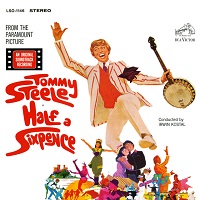 Film Soundtrack, 1968 (RCA; no CD) No stars, not recommended. All the joys of this score and in Tommy Steele’s performance can be found on the original Broadway cast recording, so there’s no need to brave the bloated soundtrack of the 1967 film adaptation in which Steele resurrected his banjo-toting Arthur Kipps. Here, every production number is extended towards eternity — “Money to Burn,” “If the Rain’s Got to Fall,” and “Flash, Bang, Wallop!” are now each seven minutes long — and whatever cinematographic choices merited such garish supersizing are obviously absent from the listening experience. Meanwhile, several songs have been cut and replaced, but of the new material, only Steele’s jaunty “Lady Botting’s Boating Regatta Cup Racing Song,” co-written by the legendary orchestrator Irwin Kostal, is worth checking out. Otherwise, Kostal’s jangly arrangements — far from his finest work — feature extensive circus and martial sounds, marching bands, and a tacky a cappella choral opening. Marti Webb, the original Ann in London, dubs Julia Foster’s singing in that role, but her soundtrack performance lacks grit: “I Know What I Am,” for instance, is plaintive and whimpery instead of boldly assertive. As for co-star Cyril Ritchard, a hammy upside of the film, his voice is basically unidentifiable on this album. Even Steele’s banjo solos here sound more interminable than impressive. — D.R.
Film Soundtrack, 1968 (RCA; no CD) No stars, not recommended. All the joys of this score and in Tommy Steele’s performance can be found on the original Broadway cast recording, so there’s no need to brave the bloated soundtrack of the 1967 film adaptation in which Steele resurrected his banjo-toting Arthur Kipps. Here, every production number is extended towards eternity — “Money to Burn,” “If the Rain’s Got to Fall,” and “Flash, Bang, Wallop!” are now each seven minutes long — and whatever cinematographic choices merited such garish supersizing are obviously absent from the listening experience. Meanwhile, several songs have been cut and replaced, but of the new material, only Steele’s jaunty “Lady Botting’s Boating Regatta Cup Racing Song,” co-written by the legendary orchestrator Irwin Kostal, is worth checking out. Otherwise, Kostal’s jangly arrangements — far from his finest work — feature extensive circus and martial sounds, marching bands, and a tacky a cappella choral opening. Marti Webb, the original Ann in London, dubs Julia Foster’s singing in that role, but her soundtrack performance lacks grit: “I Know What I Am,” for instance, is plaintive and whimpery instead of boldly assertive. As for co-star Cyril Ritchard, a hammy upside of the film, his voice is basically unidentifiable on this album. Even Steele’s banjo solos here sound more interminable than impressive. — D.R.
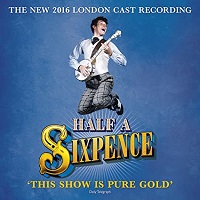 London Cast, 2016 (Exallshow Ltd)
London Cast, 2016 (Exallshow Ltd)  (1 / 5) Captured as a live recording, the aggressive revisal of Half a Sixpence that opened in 2016 at the Chichester Festival in England and later transferred to London’s West End largely drained the score of its sweet wittiness. As George Stiles and Anthony Drew had done with the stage adaptation of Mary Poppins a few years earlier, the team here again added numerous songs of their own to a pre-existing score while revising many of the originals. (There was also a brand-new book, by Downton Abbey’s Julian Fellowes.) Unfortunately, the new songs sound quite a bit like the ones that Stiles and Drew came up with for Poppins (the first two new numbers, “Look Alive” and “Believe In Yourself,” are almost rip-offs of “Cherry Tree Lane” and “Anything Can Happen”) but not at all like the work of David Heneker. And the eight and a half songs that do survive from the 1960s (“I Know Who I Am” is sadly truncated) are largely stripped of their warmth; William David Brohn’s orchestrations radiate slick bombast but seldom the tender charm of the originals. Charlie Stemp had a giddily agile presence and exuded a mix of puppy-dog innocence and deer-in-the-headlights bewilderment as Arthur Kipps on stage, but on record, he lacks the dynamic energy — not to mention the banjo skills — of Tommy Steele. Because this is a live album compiled from multiple performances during the show’s Chichester Festival Theatre run, before the West End transfer, each number is followed by lengthy applause that detracts from the listening experience, as does audience laughter at staging we can’t see. — D.R.
(1 / 5) Captured as a live recording, the aggressive revisal of Half a Sixpence that opened in 2016 at the Chichester Festival in England and later transferred to London’s West End largely drained the score of its sweet wittiness. As George Stiles and Anthony Drew had done with the stage adaptation of Mary Poppins a few years earlier, the team here again added numerous songs of their own to a pre-existing score while revising many of the originals. (There was also a brand-new book, by Downton Abbey’s Julian Fellowes.) Unfortunately, the new songs sound quite a bit like the ones that Stiles and Drew came up with for Poppins (the first two new numbers, “Look Alive” and “Believe In Yourself,” are almost rip-offs of “Cherry Tree Lane” and “Anything Can Happen”) but not at all like the work of David Heneker. And the eight and a half songs that do survive from the 1960s (“I Know Who I Am” is sadly truncated) are largely stripped of their warmth; William David Brohn’s orchestrations radiate slick bombast but seldom the tender charm of the originals. Charlie Stemp had a giddily agile presence and exuded a mix of puppy-dog innocence and deer-in-the-headlights bewilderment as Arthur Kipps on stage, but on record, he lacks the dynamic energy — not to mention the banjo skills — of Tommy Steele. Because this is a live album compiled from multiple performances during the show’s Chichester Festival Theatre run, before the West End transfer, each number is followed by lengthy applause that detracts from the listening experience, as does audience laughter at staging we can’t see. — D.R.
Cinderella (Andrew Lloyd Webber)
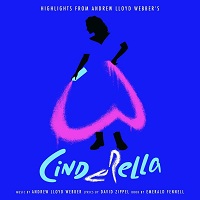 Studio Cast, 2021 (Polydor) 0 stars, not recommended. What’s there to write about Andrew Lloyd Webber’s Cinderella that hasn’t already been written and/or said? Though this “modern twist” on the fairy tale premiered in the West End to a forgivingly warm reception as one of the first shows to open after the lengthy shutdown for the COVID-19 pandemic, the musical has since been plagued by bad press and public ridicule that only intensified when it opened on Broadway under the new title Bad Cinderella, giving critics and the internet plenty of fodder for its drubbing. No stage cast recording of the score exists, only this concept album, which was recorded before the show began performances in London. It would be easy to say that the album is a flat-out disaster — and it would probably be more entertaining if it were. To be clear, there is a lot of bad material here; but on the whole, the recording is just dull, with every song sounding like a first draft. A few of the performers who would go on to appear in the West End production are on hand. As Cinderella’s Stepmother, Victoria Hamilton-Barritt goes for glorified camp and does an uncanny Joanna Lumley impression, though with diminishing returns as the album continues. And in the title role, Carrie Hope Fletcher gives as close to a fully formed performance as the material will allow. While Webber is still capable of writing a decent ear worm (“Only You, Lonely You” “I Know I Have a Heart”), every song lasts far too long, until the melodies become white noise. Plus, Webber is back in his ’80s style of musicalizing scenes that don’t need it (“So Long,” “Unfair”). The orchestrations are thin, and the lyrics, by the usually reliable David Zippel, sound like placeholders for something wittier to be written later. In an attempt to give the listener an idea of the musical’s new story line, a fair amount of dialogue is sprinkled throughout the album, but the plot is so confusing and messy that you may feel it’s easier to make sense out of a James Joyce novel. Due to the harshly negative reception of the Broadway production, a new recording of (Bad) Cinderella is unlikely, making this one a must-have for all flop collectors as a token of what will probably come to be known as the biggest failure of Andrew Lloyd Webber’s career. For anyone else, there are far better Cinderellas out there. Best to take one of them for a spin on the dance floor and leave this recording out in the pumpkin patch. — Matt Koplik
Studio Cast, 2021 (Polydor) 0 stars, not recommended. What’s there to write about Andrew Lloyd Webber’s Cinderella that hasn’t already been written and/or said? Though this “modern twist” on the fairy tale premiered in the West End to a forgivingly warm reception as one of the first shows to open after the lengthy shutdown for the COVID-19 pandemic, the musical has since been plagued by bad press and public ridicule that only intensified when it opened on Broadway under the new title Bad Cinderella, giving critics and the internet plenty of fodder for its drubbing. No stage cast recording of the score exists, only this concept album, which was recorded before the show began performances in London. It would be easy to say that the album is a flat-out disaster — and it would probably be more entertaining if it were. To be clear, there is a lot of bad material here; but on the whole, the recording is just dull, with every song sounding like a first draft. A few of the performers who would go on to appear in the West End production are on hand. As Cinderella’s Stepmother, Victoria Hamilton-Barritt goes for glorified camp and does an uncanny Joanna Lumley impression, though with diminishing returns as the album continues. And in the title role, Carrie Hope Fletcher gives as close to a fully formed performance as the material will allow. While Webber is still capable of writing a decent ear worm (“Only You, Lonely You” “I Know I Have a Heart”), every song lasts far too long, until the melodies become white noise. Plus, Webber is back in his ’80s style of musicalizing scenes that don’t need it (“So Long,” “Unfair”). The orchestrations are thin, and the lyrics, by the usually reliable David Zippel, sound like placeholders for something wittier to be written later. In an attempt to give the listener an idea of the musical’s new story line, a fair amount of dialogue is sprinkled throughout the album, but the plot is so confusing and messy that you may feel it’s easier to make sense out of a James Joyce novel. Due to the harshly negative reception of the Broadway production, a new recording of (Bad) Cinderella is unlikely, making this one a must-have for all flop collectors as a token of what will probably come to be known as the biggest failure of Andrew Lloyd Webber’s career. For anyone else, there are far better Cinderellas out there. Best to take one of them for a spin on the dance floor and leave this recording out in the pumpkin patch. — Matt Koplik
Shucked
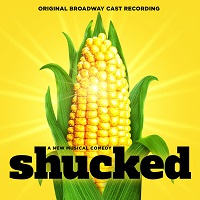 Original Broadway Cast, 2023 (Masterworks Broadway)
Original Broadway Cast, 2023 (Masterworks Broadway)  (3 / 5) Not every musical starts its cast album with the pre-show announcement. But, for better and for worse, Shucked is not every musical. The score, penned by country music veterans Brandy Clark and Shane MacAnally for their first Broadway outing, uses unabashed exposition throughout the first two songs to begin this musical tale set in Cobb County — a small town “that time forgot,” whose main import, export, and hobby is corn. The tone for the show is established in a peppy ode to that very vegetable. (Sample lyric: “It’s the same comin’ in as goin’ out!”) The main disappointment of this recording is that it can’t include the hilarious book by Robert Horn, filled to the brim with puns and one-liners, and hence loses much of the show’s charm. After the two narrators, who sarcastically help set up and comment on the story in a manner akin to Janis and Damian in Mean Girls (Grey Henson, who originated the role of Damian, even portrays Narrator 2), the first character we meet is the innocent heroine, Maizy. (Get it? I thought you might.) Caroline Innerbichler, who plays this role, has a singing voice with a charming, open twang that nicely fits the genre. The first act zips through a farcical story about a hack doctor whom Maizy brings from Tampa to Cobb County to “save the corn,” which for some reason started dying as soon as she was to get married. Plotting is not one of the strengths of Shucked, but listeners can surely lose themselves in the dreamy, husky (no pun intended) voice of Andrew Durand as Maizy’s love interest, Beau, and in the thrilling delivery of “Independently Owned” by Alex Newell as her cousin Lulu. While it’s true that the score for the first act is comprised almost entirely of “I am” and “I want” songs for the various characters, these performers are so uniquely talented that they make it all work. It’s the penultimate song of Act I, “Maybe Love,” that reveals a major problem ahead; in it, the writers begin to fully fall back on country-western cliches. As such, Act II is unfortunately bland, and although Newell’s return seems to promise more delights, he proves to be better at selling a solo number than holding up his half of a duet. The show’s conclusion is somewhat predictable, but a twist was not to be expected from this self-consciously folksy story. Bonus tracks offer the songwriters performing the two most thoroughly country-style numbers in the score; they put them across perfectly, but musical comedy writing is clearly not this team’s forte. — Charles Kirsch
(3 / 5) Not every musical starts its cast album with the pre-show announcement. But, for better and for worse, Shucked is not every musical. The score, penned by country music veterans Brandy Clark and Shane MacAnally for their first Broadway outing, uses unabashed exposition throughout the first two songs to begin this musical tale set in Cobb County — a small town “that time forgot,” whose main import, export, and hobby is corn. The tone for the show is established in a peppy ode to that very vegetable. (Sample lyric: “It’s the same comin’ in as goin’ out!”) The main disappointment of this recording is that it can’t include the hilarious book by Robert Horn, filled to the brim with puns and one-liners, and hence loses much of the show’s charm. After the two narrators, who sarcastically help set up and comment on the story in a manner akin to Janis and Damian in Mean Girls (Grey Henson, who originated the role of Damian, even portrays Narrator 2), the first character we meet is the innocent heroine, Maizy. (Get it? I thought you might.) Caroline Innerbichler, who plays this role, has a singing voice with a charming, open twang that nicely fits the genre. The first act zips through a farcical story about a hack doctor whom Maizy brings from Tampa to Cobb County to “save the corn,” which for some reason started dying as soon as she was to get married. Plotting is not one of the strengths of Shucked, but listeners can surely lose themselves in the dreamy, husky (no pun intended) voice of Andrew Durand as Maizy’s love interest, Beau, and in the thrilling delivery of “Independently Owned” by Alex Newell as her cousin Lulu. While it’s true that the score for the first act is comprised almost entirely of “I am” and “I want” songs for the various characters, these performers are so uniquely talented that they make it all work. It’s the penultimate song of Act I, “Maybe Love,” that reveals a major problem ahead; in it, the writers begin to fully fall back on country-western cliches. As such, Act II is unfortunately bland, and although Newell’s return seems to promise more delights, he proves to be better at selling a solo number than holding up his half of a duet. The show’s conclusion is somewhat predictable, but a twist was not to be expected from this self-consciously folksy story. Bonus tracks offer the songwriters performing the two most thoroughly country-style numbers in the score; they put them across perfectly, but musical comedy writing is clearly not this team’s forte. — Charles Kirsch
Charlie and the Chocolate Factory
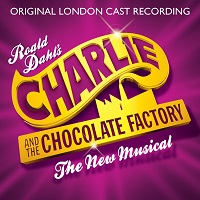 Original London Cast, 2013 (Watertower Music)
Original London Cast, 2013 (Watertower Music)  (1 / 5) The first stage iteration of Marc Shaiman and Scott Wittman’s musical adaptation of Roald Dahl’s children’s novel preserves only one of Leslie Bricusse and Anthony Newley’s songs from the film Willy Wonka and the Chocolate Factory — “Pure Imagination” — but the entire album seems to hold its breath until that track arrives very late in the proceedings. Nothing else in the new score sounds anything like it, and Shaiman and Wittman fail to crack the code on converting the episodic structure of Dahl’s book to musical theater form. Jack Costello’s Charlie is charming in the opening number, “Almost Nearly Perfect,” but the other four kids who win a tour of Willy Wonka’s factory are as madly annoying as they’re meant to be, resulting in a quartet of bad songs introducing each child in the first act and a quartet of worse songs getting rid of each child in the second. Shaiman writes music in different styles for the four families — a polka for the Gloops, an English patter song for the Salts, a poppy rap for the Beauregardes, and electronic cacophony for the Teavees — so the score never gets a chance to advance beyond Russian Roulette-style genre-jumping. Nor does the show comfortably translate Dahl’s self-aware rudeness for a contemporary audience. Augustus Gloop’s fat-shaming yodel is cringe-worthy, but the lyrics for “Vidiots,” the Oompa Loompas’ condemnation of kids who play video games, are the album’s nadir: “Alas, alas, poor Mike Teavee / For OMG, he’s ADD.” (Credit Iris Roberts for making a strong, frantic impression as Mike’s harried mother.) The songs for Wonka (Douglas Hodge) are insubstantial, too, until he finally arrives at “Pure Imagination” and listeners can breathe a sigh of relief. — Dan Rubins
(1 / 5) The first stage iteration of Marc Shaiman and Scott Wittman’s musical adaptation of Roald Dahl’s children’s novel preserves only one of Leslie Bricusse and Anthony Newley’s songs from the film Willy Wonka and the Chocolate Factory — “Pure Imagination” — but the entire album seems to hold its breath until that track arrives very late in the proceedings. Nothing else in the new score sounds anything like it, and Shaiman and Wittman fail to crack the code on converting the episodic structure of Dahl’s book to musical theater form. Jack Costello’s Charlie is charming in the opening number, “Almost Nearly Perfect,” but the other four kids who win a tour of Willy Wonka’s factory are as madly annoying as they’re meant to be, resulting in a quartet of bad songs introducing each child in the first act and a quartet of worse songs getting rid of each child in the second. Shaiman writes music in different styles for the four families — a polka for the Gloops, an English patter song for the Salts, a poppy rap for the Beauregardes, and electronic cacophony for the Teavees — so the score never gets a chance to advance beyond Russian Roulette-style genre-jumping. Nor does the show comfortably translate Dahl’s self-aware rudeness for a contemporary audience. Augustus Gloop’s fat-shaming yodel is cringe-worthy, but the lyrics for “Vidiots,” the Oompa Loompas’ condemnation of kids who play video games, are the album’s nadir: “Alas, alas, poor Mike Teavee / For OMG, he’s ADD.” (Credit Iris Roberts for making a strong, frantic impression as Mike’s harried mother.) The songs for Wonka (Douglas Hodge) are insubstantial, too, until he finally arrives at “Pure Imagination” and listeners can breathe a sigh of relief. — Dan Rubins
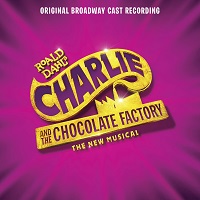 Original Broadway Cast, 2017 (Masterworks)
Original Broadway Cast, 2017 (Masterworks)  (2 / 5) This Broadway recording is a marked improvement over the London cast album, not least for the reintroduction of most of the songs from the 1971 film Willy Wonka and the Chocolate Factory: “Candy Man,” “I’ve Got A Golden Ticket,” and “Oompa Loompa” all join “Pure Imagination.” Christian Borle has greater range than Douglas Hodge as Willy Wonka, and his opening rendition of “The Candy Man” sets a clearer tone for the character. The album generously rotates through the three young actors who played Charlie on Broadway, with Jake Ryan Flynn making a particularly terrific impression in a new, joyous waltz, “Willy Wonka! Willy Wonka!” and also in “The View From Here,” a sweet ballad with rousing counterpoint. Most of the other kids’ songs, including the deadly “Vidiots,” remain in some form; but a major casting change, with adults playing all the children except Charlie, makes the show’s added cruelties towards these characters somewhat more tolerable. That said, a notorious scene from this production, in which squirrels tear Veruca Salt (now inexplicably Russian) to pieces, is commemorated on the album in “Veruca’s Nutcracker Sweet,” which contains tasteless couplets such as “Veruca Salt was once en pointe / But watch as we dislocate each joint.” On the plus side, Trista Dollison is especially good in “The Queen of Pop,” Violet’s intro song, which recalls Shaiman and Wittman’s far superior work for Hairspray. The new, discomfiting song “When Willy Meets Oompa” seems to double down on the Oompa Loompa plot line’s colonial undercurrents, but there’s enough inoffensive sweetness elsewhere — courtesy of the three Charlies, John Rubinstein’s Grandpa Joe, and Borle’s ballads — to make this a listenable album. — D.R.
(2 / 5) This Broadway recording is a marked improvement over the London cast album, not least for the reintroduction of most of the songs from the 1971 film Willy Wonka and the Chocolate Factory: “Candy Man,” “I’ve Got A Golden Ticket,” and “Oompa Loompa” all join “Pure Imagination.” Christian Borle has greater range than Douglas Hodge as Willy Wonka, and his opening rendition of “The Candy Man” sets a clearer tone for the character. The album generously rotates through the three young actors who played Charlie on Broadway, with Jake Ryan Flynn making a particularly terrific impression in a new, joyous waltz, “Willy Wonka! Willy Wonka!” and also in “The View From Here,” a sweet ballad with rousing counterpoint. Most of the other kids’ songs, including the deadly “Vidiots,” remain in some form; but a major casting change, with adults playing all the children except Charlie, makes the show’s added cruelties towards these characters somewhat more tolerable. That said, a notorious scene from this production, in which squirrels tear Veruca Salt (now inexplicably Russian) to pieces, is commemorated on the album in “Veruca’s Nutcracker Sweet,” which contains tasteless couplets such as “Veruca Salt was once en pointe / But watch as we dislocate each joint.” On the plus side, Trista Dollison is especially good in “The Queen of Pop,” Violet’s intro song, which recalls Shaiman and Wittman’s far superior work for Hairspray. The new, discomfiting song “When Willy Meets Oompa” seems to double down on the Oompa Loompa plot line’s colonial undercurrents, but there’s enough inoffensive sweetness elsewhere — courtesy of the three Charlies, John Rubinstein’s Grandpa Joe, and Borle’s ballads — to make this a listenable album. — D.R.
Willy Wonka and the Chocolate Factory
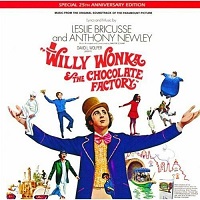 Film Soundtrack, 1971 (Geffen)
Film Soundtrack, 1971 (Geffen)  (3 / 5) This slim film soundtrack — featuring six full songs by Leslie Bricusse and Anthony Newley, plus some reprises and several lovely instrumentals also credited to the pair — grounds itself in the film’s most sensational song, “Pure Imagination.” As Wonka, Gene Wilder delivers that song with leisurely grace, but the album’s richest tracks, “The Wondrous Boat Ride” and “Wonkavator/End Title,” offer the melody in a few different iterations with orchestral majesty. (Walter Scharf was the film’s music arranger and conductor.) Among the other highlights to be found here are an endearing rendition of “Cheer Up, Charlie” by Diana Lee, dubbing for Diana Sowle in the role of Charlie’s mother, and the amazingly demonic Julie Dawn Cole as Veruca Salt tearing her way through “I Want It Now.” “The Candy Man” is a too-treacly classic, but the goofy, oft-reprised “Oompa Loompa” theme earns its iconic status. Several underscored spoken dialogue scenes are included on the album as a reminder of some of the film’s less-celebrated performances. [Ed. Note: For reviews of the two cast recordings of the stage musical inspired by this film and its source material, Charlie and the Chocolate Factory, see the separate entry under that title.] — Dan Rubins
(3 / 5) This slim film soundtrack — featuring six full songs by Leslie Bricusse and Anthony Newley, plus some reprises and several lovely instrumentals also credited to the pair — grounds itself in the film’s most sensational song, “Pure Imagination.” As Wonka, Gene Wilder delivers that song with leisurely grace, but the album’s richest tracks, “The Wondrous Boat Ride” and “Wonkavator/End Title,” offer the melody in a few different iterations with orchestral majesty. (Walter Scharf was the film’s music arranger and conductor.) Among the other highlights to be found here are an endearing rendition of “Cheer Up, Charlie” by Diana Lee, dubbing for Diana Sowle in the role of Charlie’s mother, and the amazingly demonic Julie Dawn Cole as Veruca Salt tearing her way through “I Want It Now.” “The Candy Man” is a too-treacly classic, but the goofy, oft-reprised “Oompa Loompa” theme earns its iconic status. Several underscored spoken dialogue scenes are included on the album as a reminder of some of the film’s less-celebrated performances. [Ed. Note: For reviews of the two cast recordings of the stage musical inspired by this film and its source material, Charlie and the Chocolate Factory, see the separate entry under that title.] — Dan RubinsSoft Power
 Original Off-Broadway Cast, 2020 (Ghostlight)
Original Off-Broadway Cast, 2020 (Ghostlight)  (2 / 5) If this cast album confuses some listeners, that may be because they don’t understand the show’s central conceit, and can you blame them? It’s pretty much impossible to glean from the recording. This reviewer had to read several synopses of Soft Power before understanding that, essentially, the content of the show and the album is the result of a fever dream had by DHH — a character unsubtly named after the show’s librettist/lyricist, David Henry Hwang, and played here by Francis Jue. After being commissioned by a Chinese producer, Xue Xing, to write a musical, DHH gets stabbed in an act of racial violence, as Hwang did in real life, and goes into a coma in which he imagines a reverse King and I wherein a fictionalized Xue Xing comes to America and falls in love with (who else?) Hillary Clinton. This gimmicky concept could probably hold up for the length of, say, a Saturday Night Live skit; but Hwang and the show’s composer, Jeanine Tesori, here parodying the expansive style of the golden age Broadway musical, have trouble sustaining it for almost the entirety of the piece. At the beginning, the comical “Welcome to America,” featuring a painfully awkward rap that references Dirty Harry and Rolex, may elicit a few chuckles, and “Election Night,” which attempts to explain the messiness of the Electoral College system in Schoolhouse Rock-like fashion, might prompt a smile or two. But “It Takes Time,” a belabored parody of “Shall We Dance?” in which Xue attempts to teach Hillary the basic points of Mandarin, and “The New Silk Road,” an overlong battle cry in which Xue convinces the American people to lay down their guns and learn from China’s example, will likely make the listener feel as if the concept has gone on way too long. One of the strengths of this recording, though, is Conrad Ricamora, who lends a velvety, confident voice to the role of Xue and single-handedly holds the album together. Alyse Alan Louis does an admirable job of voicing Hillary, although she can’t quite sell the watered-down, bluesy “Rose’s Turn” takeoff titled “Song of the Campaign.” It could be largely because of the difference in perspective from 2023 (when this review was written) as compared to 2020 (when Soft Power was produced and this album was recorded), but all of the references to America’s “Dear Leader” now feel more like sad punches in the gut than incisive, comic observations. In the final and perhaps most jarring tonal shift, the show’s closing number, “Democracy” seems to be almost congratulating the audience on their progress and promising them a better future, thereby undermining the cynicism of the entire piece. In sum, this cast album has the soft power to occasionally entertain but lacks the ability to send a serious message. — Charles Kirsch
(2 / 5) If this cast album confuses some listeners, that may be because they don’t understand the show’s central conceit, and can you blame them? It’s pretty much impossible to glean from the recording. This reviewer had to read several synopses of Soft Power before understanding that, essentially, the content of the show and the album is the result of a fever dream had by DHH — a character unsubtly named after the show’s librettist/lyricist, David Henry Hwang, and played here by Francis Jue. After being commissioned by a Chinese producer, Xue Xing, to write a musical, DHH gets stabbed in an act of racial violence, as Hwang did in real life, and goes into a coma in which he imagines a reverse King and I wherein a fictionalized Xue Xing comes to America and falls in love with (who else?) Hillary Clinton. This gimmicky concept could probably hold up for the length of, say, a Saturday Night Live skit; but Hwang and the show’s composer, Jeanine Tesori, here parodying the expansive style of the golden age Broadway musical, have trouble sustaining it for almost the entirety of the piece. At the beginning, the comical “Welcome to America,” featuring a painfully awkward rap that references Dirty Harry and Rolex, may elicit a few chuckles, and “Election Night,” which attempts to explain the messiness of the Electoral College system in Schoolhouse Rock-like fashion, might prompt a smile or two. But “It Takes Time,” a belabored parody of “Shall We Dance?” in which Xue attempts to teach Hillary the basic points of Mandarin, and “The New Silk Road,” an overlong battle cry in which Xue convinces the American people to lay down their guns and learn from China’s example, will likely make the listener feel as if the concept has gone on way too long. One of the strengths of this recording, though, is Conrad Ricamora, who lends a velvety, confident voice to the role of Xue and single-handedly holds the album together. Alyse Alan Louis does an admirable job of voicing Hillary, although she can’t quite sell the watered-down, bluesy “Rose’s Turn” takeoff titled “Song of the Campaign.” It could be largely because of the difference in perspective from 2023 (when this review was written) as compared to 2020 (when Soft Power was produced and this album was recorded), but all of the references to America’s “Dear Leader” now feel more like sad punches in the gut than incisive, comic observations. In the final and perhaps most jarring tonal shift, the show’s closing number, “Democracy” seems to be almost congratulating the audience on their progress and promising them a better future, thereby undermining the cynicism of the entire piece. In sum, this cast album has the soft power to occasionally entertain but lacks the ability to send a serious message. — Charles Kirsch
Dessa Rose
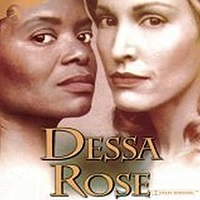 Original Off-Broadway Cast, 2005 (JAY)
Original Off-Broadway Cast, 2005 (JAY)  (4 / 5) Based on Sherley Anne Williams’ 1986 novel about the intertwined stories and gradual friendship of a Black woman and a white woman in the Antebellum South, Dessa Rose remains Lynn Ahrens and Stephen Flaherty’s most sweeping, ambitious score since Ragtime. It also makes for an epic cast album with a whopping 68 tracks and over two hours of material, including all dialogue (also by Ahrens) and all the necessary sound effects to convey the show’s dramatic events. Since Dessa Rose is heavily narrated by the title character (LaChanze) and Ruth (Rachel York), reminiscing in their old age, it’s easy to follow the plot from the recording once the two women meet and the show shakes loose its early flashback-within-a-flashback knottiness. As Dessa Rose, an enslaved woman willing to do anything to fight for her freedom, LaChanze, an early Ahrens and Flaherty muse (as in Once On This Island, a score that’s occasionally referenced here in some livelier ensemble moments), offers a gripping performance, especially in her Act One solos, “Something Of My Own” and “Twelve Children.” York is a terrific counterbalance as a prim Southern belle who opens her home and her heart to Dessa Rose and her companions fleeing slavery. Norm Lewis also gives a warmly winning performance as Nathan, who falls for Ruth, and Kecia Lewis sings the ballad “White Milk, Red Blood” movingly. Though the first act is rather exposition-heavy, and the longer soliloquies interrupt the album’s often-propulsive momentum, the show takes off in the second act once the two women turn against each other in a fiery pair of numbers, “Better If I Died” and “Just Over the Line.” It’s occasionally obvious that Dessa Rose shares its composer with Ragtime, but Flaherty ultimately carves out a tensely operatic sound for the score that stands alone among his works, powered by banjo-rich orchestrations courtesy of William David Brohn and Christopher Jahnke. (The rousing vocal arrangements are by Flaherty himself.) With its audio play expansiveness, the Dessa Rose cast recording makes for a compelling, powerful listen. — Dan Rubins
(4 / 5) Based on Sherley Anne Williams’ 1986 novel about the intertwined stories and gradual friendship of a Black woman and a white woman in the Antebellum South, Dessa Rose remains Lynn Ahrens and Stephen Flaherty’s most sweeping, ambitious score since Ragtime. It also makes for an epic cast album with a whopping 68 tracks and over two hours of material, including all dialogue (also by Ahrens) and all the necessary sound effects to convey the show’s dramatic events. Since Dessa Rose is heavily narrated by the title character (LaChanze) and Ruth (Rachel York), reminiscing in their old age, it’s easy to follow the plot from the recording once the two women meet and the show shakes loose its early flashback-within-a-flashback knottiness. As Dessa Rose, an enslaved woman willing to do anything to fight for her freedom, LaChanze, an early Ahrens and Flaherty muse (as in Once On This Island, a score that’s occasionally referenced here in some livelier ensemble moments), offers a gripping performance, especially in her Act One solos, “Something Of My Own” and “Twelve Children.” York is a terrific counterbalance as a prim Southern belle who opens her home and her heart to Dessa Rose and her companions fleeing slavery. Norm Lewis also gives a warmly winning performance as Nathan, who falls for Ruth, and Kecia Lewis sings the ballad “White Milk, Red Blood” movingly. Though the first act is rather exposition-heavy, and the longer soliloquies interrupt the album’s often-propulsive momentum, the show takes off in the second act once the two women turn against each other in a fiery pair of numbers, “Better If I Died” and “Just Over the Line.” It’s occasionally obvious that Dessa Rose shares its composer with Ragtime, but Flaherty ultimately carves out a tensely operatic sound for the score that stands alone among his works, powered by banjo-rich orchestrations courtesy of William David Brohn and Christopher Jahnke. (The rousing vocal arrangements are by Flaherty himself.) With its audio play expansiveness, the Dessa Rose cast recording makes for a compelling, powerful listen. — Dan Rubins
Rocky
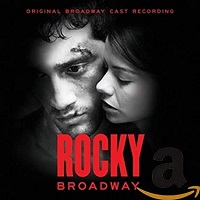 Original Broadway Cast, 2014 (UMe)
Original Broadway Cast, 2014 (UMe)  (3 / 5) Rocky finds Lynn Ahrens and Stephen Flaherty writing to order. At the center of this adaptation are two songs, from the film on which the musical is based and one of its sequels, that A&F had nothing to do with creating — ”Gonna Fly Now” (the iconic Rocky theme) and “Eye of the Tiger” (a big hit from Rocky III) — and the rest of the score seems forced to coalesce around those famous workout anthems. Most of the songs about boxing are undistinguished and indistinguishable from one another, recalling the film soundtracks as best they can. It’s a small miracle, then, that Ahrens and Flaherty, carve out space for a lovely collection of other songs charting the tenderly tentative relationship of the down-on-his-luck boxer Rocky Balboa (Andy Karl) and the traumatized Adrian (Margo Seibert). As heard on the cast album, Seibert is stunning in the brief self-empowerment ballad “I’m Done,” and the pair are sweetly hesitant in the skating rink waltz “The Flip Side.” A&F gave themselves an additional challenge in writing so much material for the under-educated and semi-literate Rocky; for example, the halting “Adrian” feelingly showcases the pair’s gifts at writing for specific characters as it tests the limits of the protagonist’s verbal self-expression. Best of all, though, is Adrian’s “Raining,” one of Ahrens’ most haunting lyrics set to a surging, churning melody, tinged with electric guitar licks, that sounds unlike anything else Flaherty has penned. Too often, this score treads water until the next training montage, but with so much distraction in the ring, credit the writers with landing at least one knockout punch. — Dan Rubins
(3 / 5) Rocky finds Lynn Ahrens and Stephen Flaherty writing to order. At the center of this adaptation are two songs, from the film on which the musical is based and one of its sequels, that A&F had nothing to do with creating — ”Gonna Fly Now” (the iconic Rocky theme) and “Eye of the Tiger” (a big hit from Rocky III) — and the rest of the score seems forced to coalesce around those famous workout anthems. Most of the songs about boxing are undistinguished and indistinguishable from one another, recalling the film soundtracks as best they can. It’s a small miracle, then, that Ahrens and Flaherty, carve out space for a lovely collection of other songs charting the tenderly tentative relationship of the down-on-his-luck boxer Rocky Balboa (Andy Karl) and the traumatized Adrian (Margo Seibert). As heard on the cast album, Seibert is stunning in the brief self-empowerment ballad “I’m Done,” and the pair are sweetly hesitant in the skating rink waltz “The Flip Side.” A&F gave themselves an additional challenge in writing so much material for the under-educated and semi-literate Rocky; for example, the halting “Adrian” feelingly showcases the pair’s gifts at writing for specific characters as it tests the limits of the protagonist’s verbal self-expression. Best of all, though, is Adrian’s “Raining,” one of Ahrens’ most haunting lyrics set to a surging, churning melody, tinged with electric guitar licks, that sounds unlike anything else Flaherty has penned. Too often, this score treads water until the next training montage, but with so much distraction in the ring, credit the writers with landing at least one knockout punch. — Dan Rubins
The Glorious Ones
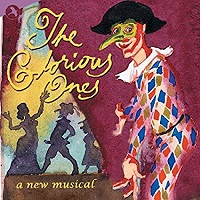 Original Off-Broadway Cast, 2008 (JAY)
Original Off-Broadway Cast, 2008 (JAY)  (3 / 5) The commedia dell’arte players who are the characters in Lynn Ahrens and Stephen Flaherty’s musical The Glorious Ones declare in the titular opening number that they will perform “with one hand on the crotch and one hand on the heart.” But Ahrens and Flaherty, from Once On This Island to Ragtime to Seussical, have been all blissful heart, and the songs in this score that strive for coarseness (“Making Love,” “Armanda’s Tarantella”) come across as semi-apologetic gropes. Flaherty’s flexible compositional voice usually molds artfully around the setting and style of each show, but The Glorious Ones never quite embraces a Flahertian version of 17th-century Italy. For example, the vaudevillian “Comedy of Love” and “Rise and Fall” sound a lot like Ragtime’s turn-of-the-century showbiz scenes. What is consistent about the score is the use of triple meter; like A Little Night Music, almost every song is in some variation of waltz time, although the lovely ballad “The World She Writes,” a metrical exception featuring the lush-voiced Erin Davie, is the album’s best track. By the time we arrive at the show’s apex, the impresario Flaminio Scala’s post-mortem soliloquy “I Was Here,” that song in three-quarter time rhythmically blends into too much of what’s come before. Still, Flaherty is a masterful melodist, and Ahrens is ever-thoughtful and clear in her lyrics, so the score never grates. As Flaminio and his lover Columbina, Marc Kudisch and Natalie Venetia Belcon get the meatiest music, but Julyana Soelistyo as the dwarf Armanda, leading the potent “Armanda’s Sack,” makes the most lasting impression. Michael Starobin’s orchestrations shimmer characteristically, especially in his gentle brass writing. The album features a few bonus tracks, including a brief orchestral suite. — Dan Rubins
(3 / 5) The commedia dell’arte players who are the characters in Lynn Ahrens and Stephen Flaherty’s musical The Glorious Ones declare in the titular opening number that they will perform “with one hand on the crotch and one hand on the heart.” But Ahrens and Flaherty, from Once On This Island to Ragtime to Seussical, have been all blissful heart, and the songs in this score that strive for coarseness (“Making Love,” “Armanda’s Tarantella”) come across as semi-apologetic gropes. Flaherty’s flexible compositional voice usually molds artfully around the setting and style of each show, but The Glorious Ones never quite embraces a Flahertian version of 17th-century Italy. For example, the vaudevillian “Comedy of Love” and “Rise and Fall” sound a lot like Ragtime’s turn-of-the-century showbiz scenes. What is consistent about the score is the use of triple meter; like A Little Night Music, almost every song is in some variation of waltz time, although the lovely ballad “The World She Writes,” a metrical exception featuring the lush-voiced Erin Davie, is the album’s best track. By the time we arrive at the show’s apex, the impresario Flaminio Scala’s post-mortem soliloquy “I Was Here,” that song in three-quarter time rhythmically blends into too much of what’s come before. Still, Flaherty is a masterful melodist, and Ahrens is ever-thoughtful and clear in her lyrics, so the score never grates. As Flaminio and his lover Columbina, Marc Kudisch and Natalie Venetia Belcon get the meatiest music, but Julyana Soelistyo as the dwarf Armanda, leading the potent “Armanda’s Sack,” makes the most lasting impression. Michael Starobin’s orchestrations shimmer characteristically, especially in his gentle brass writing. The album features a few bonus tracks, including a brief orchestral suite. — Dan Rubins
Between the Lines
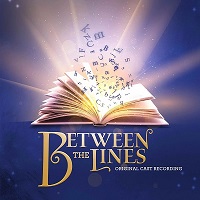 Original Off-Broadway Cast, 2022 (Ghostlight)
Original Off-Broadway Cast, 2022 (Ghostlight)  (3 / 5) Are you ever too old to fall in love with a fairytale? Or a fairytale prince? This question is the basis for Between the Lines, a musical by Elyssa Samsel and Kate Anderson that premiered Offf-Broadway in 2022. The show centers on troubled teen Delilah McPhee, who has to navigate life as a target of school bullies and the daughter of a divorced, broke, single mother. In order to survive her situation, Delilah has to find a way out, and she does that by falling in love with the prince from a fairytale book she has recently begun to read, the only copy of which happens to be in her school library. As the location of the show switches back and forth between reality and the fantasy world of the book, it’s easy for the cast album listener to get lost, all the more so because no interstitial dialogue is recorded here. For example, does Will Burton’s charming soft-shoe “Out of Character” come off as well if you don’t realize until the end of the song that he’s playing a dog? Or will you understand that, when Vicki Lewis performs “Can’t Get ‘Em Out,” she is playing the book’s author rather than a therapist or one of the few other characters she portrays in the show? As for the score itself, the main problem it that it suffers from a lack of originality. Since there are comparatively few teenage musicals, it’s impossible not to draw comparisons between this show’s high school outcast anthem “Allie McAndrews” and “I’d Rather Be Me” from Mean Girls, or between “Leaps and Bounds,” the nostalgic ballad heartbreakingly performed here by Julia Murney as Delilah’s mother, and, say, “Stop, Time” from Big. None of this is meant to suggest that Between the Lines is without its merits, the greatest ones being the catchiness of the tunes, whether melancholy or up-tempo, and the charming vocal performance by Jake David Smith as the handsome prince. Arielle Jacobs’ portrayal of Delilah is also compelling, and if some of the challenging score lies a bit outside of her vocal range, she has the acting chops to make up for it. Because of the many nice opportunities this show affords its cast in addition to the relatable story, it almost cries out for regional productions, and one can easily imagine that some of the score’s solo ballads will become audition room standards. So, ultimately, Between the Lines is worth your time, even if it’s a story you may feel you have read before. –– Charles Kirsch
(3 / 5) Are you ever too old to fall in love with a fairytale? Or a fairytale prince? This question is the basis for Between the Lines, a musical by Elyssa Samsel and Kate Anderson that premiered Offf-Broadway in 2022. The show centers on troubled teen Delilah McPhee, who has to navigate life as a target of school bullies and the daughter of a divorced, broke, single mother. In order to survive her situation, Delilah has to find a way out, and she does that by falling in love with the prince from a fairytale book she has recently begun to read, the only copy of which happens to be in her school library. As the location of the show switches back and forth between reality and the fantasy world of the book, it’s easy for the cast album listener to get lost, all the more so because no interstitial dialogue is recorded here. For example, does Will Burton’s charming soft-shoe “Out of Character” come off as well if you don’t realize until the end of the song that he’s playing a dog? Or will you understand that, when Vicki Lewis performs “Can’t Get ‘Em Out,” she is playing the book’s author rather than a therapist or one of the few other characters she portrays in the show? As for the score itself, the main problem it that it suffers from a lack of originality. Since there are comparatively few teenage musicals, it’s impossible not to draw comparisons between this show’s high school outcast anthem “Allie McAndrews” and “I’d Rather Be Me” from Mean Girls, or between “Leaps and Bounds,” the nostalgic ballad heartbreakingly performed here by Julia Murney as Delilah’s mother, and, say, “Stop, Time” from Big. None of this is meant to suggest that Between the Lines is without its merits, the greatest ones being the catchiness of the tunes, whether melancholy or up-tempo, and the charming vocal performance by Jake David Smith as the handsome prince. Arielle Jacobs’ portrayal of Delilah is also compelling, and if some of the challenging score lies a bit outside of her vocal range, she has the acting chops to make up for it. Because of the many nice opportunities this show affords its cast in addition to the relatable story, it almost cries out for regional productions, and one can easily imagine that some of the score’s solo ballads will become audition room standards. So, ultimately, Between the Lines is worth your time, even if it’s a story you may feel you have read before. –– Charles Kirsch
Kimberly Akimbo
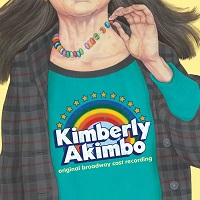 Original Broadway Cast, 2023 (Ghostlight)
Original Broadway Cast, 2023 (Ghostlight)  (5 / 5) Based on David Lindsay-Abaire’s play of the same title, Kimberly Akimbo tells the story of Kimberly Levaco (Victoria Clark), a girl with a rare disease that causes her body to age rapidly, causing her to look 65 at the age of 16. Despite this major setback, Kimberly is determined to enjoy as much of her life as she can, since she’s unsure just how much longer her life will last. It’s that blend of sardonic edge and heartfelt optimism that ultimately makes this such a special musical. In their second collaboration, Lindsay-Abaire and composer Jeanine Tesori have created an unassuming work that hides its creativity and complexity in plain sight. Abaire’s lyrics are exceptionally intelligent, sometimes taking twisted turns (the hilarious “Better”) and sometimes deeply earnest (the quietly devastating “Before I Go”), but always organic to the story and characters, and never calling attention to themselves. Tesori, meanwhile, proves once again that she is one of the most versatile musical theater composers around. She has created here a score filled with pastiches of numerous song genres (’90s folk, ’70s disco, blues, current pop, faux-classical), yet the score never has the feeling of oscillating from one style to the other; rather, it seamlessly blends. The cast is exceptional. Steven Boyer and Alli Mauzey are appropriately narcissistic as Kimberly’s parents, getting a chance to show their characters’ messiness (in Boyer’s “Happy for Her” and Mauzey’s “Hello Darling” and reprises) while also displaying some depth (in “Hello Baby” and “Father Time”). Bonnie Milligan is a scene stealer as Kimberly’s delinquent aunt Debra, whose latest scheme consumes much of the plot of Act Two. Given the most off kilter humor of the show, Milligan offers dry delivery of dialogue and barn raising vocals that ground Abaire’s comedy, keeping songs such as “Better” and “How to Wash a Check” from going off the rails. Justin Cooley is incredibly charming as Kimberly’s classmate Seth, who has a passion for making anagrams (the show’s title is a blend of Kimberly’s name and the anagram Seth makes out of it). At the center of it all, Clark is other-worldly good in the title role. In songs like “Anagram” and “Make a Wish,” one can hear her communicate Kimberly’s teenage spirit while also embracing the character’s elderly body and voice, but Clark refuses to go broad or become a caricature. Like the musical itself, the simplicity of her performance is what makes it so profound. Happily, the audio quality of this recording is so crisp and clear that listeners can hear every nuance of the vocal performances, as well as John Clancy’s multi-faceted orchestrations and Tesori’s tight vocal arrangements for the teenage ensemble. One could keep going on about every minute aspect of this cast album, but the ultimate praise is to tell you to just go ahead and listen. And then listen again. And again. — Matt Koplik
(5 / 5) Based on David Lindsay-Abaire’s play of the same title, Kimberly Akimbo tells the story of Kimberly Levaco (Victoria Clark), a girl with a rare disease that causes her body to age rapidly, causing her to look 65 at the age of 16. Despite this major setback, Kimberly is determined to enjoy as much of her life as she can, since she’s unsure just how much longer her life will last. It’s that blend of sardonic edge and heartfelt optimism that ultimately makes this such a special musical. In their second collaboration, Lindsay-Abaire and composer Jeanine Tesori have created an unassuming work that hides its creativity and complexity in plain sight. Abaire’s lyrics are exceptionally intelligent, sometimes taking twisted turns (the hilarious “Better”) and sometimes deeply earnest (the quietly devastating “Before I Go”), but always organic to the story and characters, and never calling attention to themselves. Tesori, meanwhile, proves once again that she is one of the most versatile musical theater composers around. She has created here a score filled with pastiches of numerous song genres (’90s folk, ’70s disco, blues, current pop, faux-classical), yet the score never has the feeling of oscillating from one style to the other; rather, it seamlessly blends. The cast is exceptional. Steven Boyer and Alli Mauzey are appropriately narcissistic as Kimberly’s parents, getting a chance to show their characters’ messiness (in Boyer’s “Happy for Her” and Mauzey’s “Hello Darling” and reprises) while also displaying some depth (in “Hello Baby” and “Father Time”). Bonnie Milligan is a scene stealer as Kimberly’s delinquent aunt Debra, whose latest scheme consumes much of the plot of Act Two. Given the most off kilter humor of the show, Milligan offers dry delivery of dialogue and barn raising vocals that ground Abaire’s comedy, keeping songs such as “Better” and “How to Wash a Check” from going off the rails. Justin Cooley is incredibly charming as Kimberly’s classmate Seth, who has a passion for making anagrams (the show’s title is a blend of Kimberly’s name and the anagram Seth makes out of it). At the center of it all, Clark is other-worldly good in the title role. In songs like “Anagram” and “Make a Wish,” one can hear her communicate Kimberly’s teenage spirit while also embracing the character’s elderly body and voice, but Clark refuses to go broad or become a caricature. Like the musical itself, the simplicity of her performance is what makes it so profound. Happily, the audio quality of this recording is so crisp and clear that listeners can hear every nuance of the vocal performances, as well as John Clancy’s multi-faceted orchestrations and Tesori’s tight vocal arrangements for the teenage ensemble. One could keep going on about every minute aspect of this cast album, but the ultimate praise is to tell you to just go ahead and listen. And then listen again. And again. — Matt Koplik

